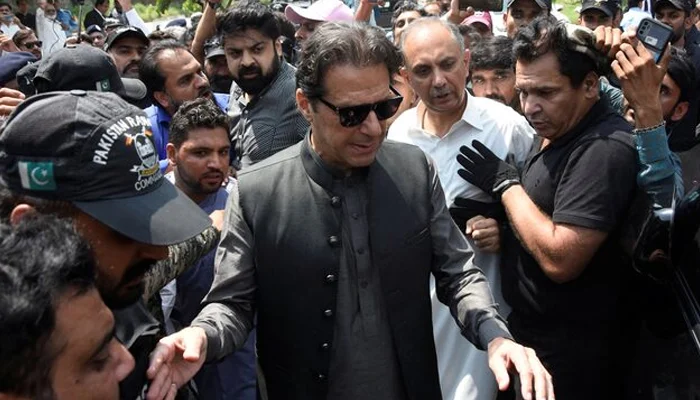London: In a surprising twist, talks for Imran Khan’s release actually began in November 2024. Long before the American-Pakistani delegation flew to Pakistan in March 2025, confidential meetings took place in Adiala Jail. Imran Khan personally met one of his longtime associates to explore a way forward.
Sources close to the matter confirmed that the former prime minister held multiple rounds of discussions inside jail. The meetings were held with a well-known American-Pakistani who has been Khan’s friend and donor for nearly 20 years. This individual frequently visited Khan when he was in power.
These secret talks for Imran Khan’s release were described as detailed and serious. Khan, according to insiders, showed willingness to reach a settlement with the government and the military establishment. He was close to an agreement—until a dramatic change of events.
Khan was assured by senior KP leaders, including Ali Amin Gandapur, that a massive crowd would join the long march to Islamabad. He was told that the street agitation would shake the system enough to trigger negotiations on his own terms.
Encouraged by these promises, Khan pulled out of the negotiations. He believed that the agitation would set him free. He ended the discussions and sent a strong message to state authorities, insisting that street pressure would decide his political future.
The meetings were facilitated by government officers. Their aim was to stop Khan from choosing agitation and instead accept demands such as taking responsibility for the May 9 incident and disciplining his digital media team. But the attempt collapsed. The protest failed. PTI’s position weakened badly and has not fully recovered since.
After the violent November 2024 incident in Islamabad, where Bushra Bibi and Gandapur fled amid live gunfire, a fresh effort began. This time, it was launched from the United States. A group of overseas PTI supporters initiated a new round of talks for Imran Khan’s release.
Leading the initiative was Tanweer Ahmed, a wealthy businessman who donated $9 million to NUST. He coordinated the delegation, which included Atif Khan (PTI USA), Dr Usman Malik, Dr Saira Bilal, Dr Mohammad Munir, and Sardar Abdul Sami. The group came under the banner of the First Pakistan Global NGO.
Atif did not enter Pakistan but played a key role from Dubai. The others held two long sessions with senior government officers inside Pakistan. One meeting lasted three hours, the other around five.
Their main demand: “Release Imran Khan and other jailed PTI leaders, and allow us to meet him.” But they were told plainly that no such requests would be granted. Officials called their campaigns “anti-Pakistan” and dismissed them as ineffective.
The delegation was told that their activities had only helped social media personalities. YouTubers, they said, were the real winners—making money from hype while doing nothing for Khan. Some of these content creators were accused of damaging Khan’s image for personal profits.
However, some progress was made. Both sides agreed that future discussions would continue. It was also agreed that PTI supporters abroad would avoid social media campaigns that could hurt Khan’s chances of freedom. Delegates promised to distance their supporters from controversial influencers.
A meeting participant even warned a former anchor in the US that if he vanished during his trip, people should raise their voice. The delegation, including Ahmed, Dr Bilal, Dr Malik Usman, and Mohammad Munir, eventually flew back to the US via Qatar.
When the news broke on social media, it sparked chaos. PTI’s digital space turned hostile. Delegates were labelled traitors on X, accused of betrayal on YouTube, and called sellouts on Meta. Online wars exploded, with influencers targeting the delegation.
Despite the backlash, key PTI figures defended the move. Tanweer Ahmed stood firm. He praised the delegates and criticized YouTubers who he said only cared about views. He claimed that if Khan were released, these content creators would lose thousands of dollars in daily earnings.
Atif Khan also pushed back. He said many within PTI did not want reconciliation because they feared losing influence. He proudly admitted encouraging the team to go to Pakistan and negotiate. He said Sajjad Burki, a senior PTI USA leader, also backed the idea.
In a fresh development, PTI leader Azam Swati publicly supported dialogue with the state. He said Imran Khan agreed with the idea. But Salman Akram Raja, PTI Secretary General, disagreed. He said Swati’s statement was his own opinion and that Khan had not changed his stance.
As talks for Imran Khan’s release continue behind the scenes, the rift within PTI’s global support base grows wider. While some push for engagement, others cling to confrontation. The outcome remains uncertain.


